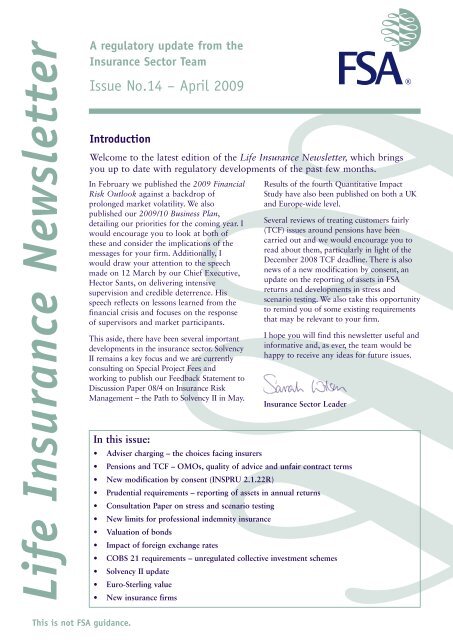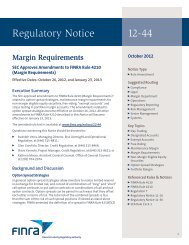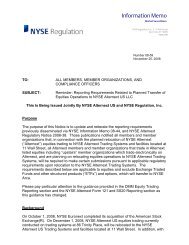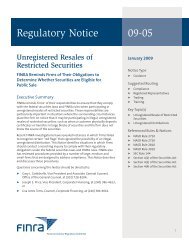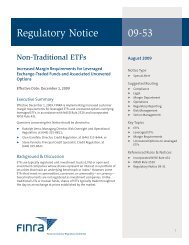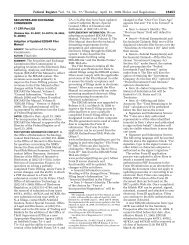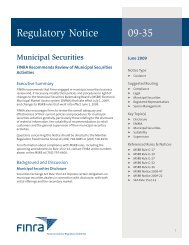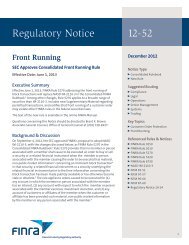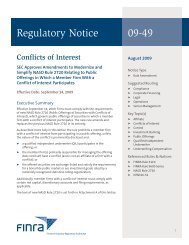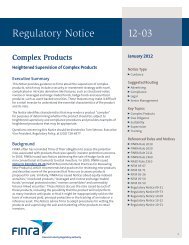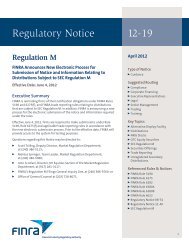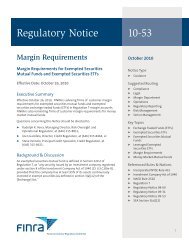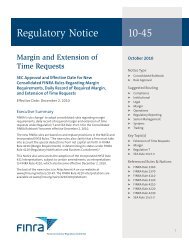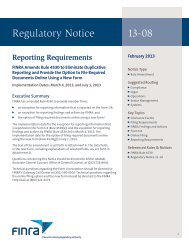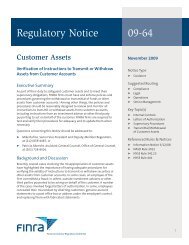Life insurance newsletter: Issue 14 - FINRA - Rules and Regulations
Life insurance newsletter: Issue 14 - FINRA - Rules and Regulations
Life insurance newsletter: Issue 14 - FINRA - Rules and Regulations
Create successful ePaper yourself
Turn your PDF publications into a flip-book with our unique Google optimized e-Paper software.
<strong>Life</strong> Insurance Newsletter<br />
A regulatory update from the<br />
Insurance Sector Team<br />
<strong>Issue</strong> No.<strong>14</strong> – April 2009<br />
Introduction<br />
Welcome to the latest edition of the <strong>Life</strong> Insurance Newsletter, which brings<br />
you up to date with regulatory developments of the past few months.<br />
In February we published the 2009 Financial<br />
Risk Outlook against a backdrop of<br />
prolonged market volatility. We also<br />
published our 2009/10 Business Plan,<br />
detailing our priorities for the coming year. I<br />
would encourage you to look at both of<br />
these <strong>and</strong> consider the implications of the<br />
messages for your firm. Additionally, I<br />
would draw your attention to the speech<br />
made on 12 March by our Chief Executive,<br />
Hector Sants, on delivering intensive<br />
supervision <strong>and</strong> credible deterrence. His<br />
speech reflects on lessons learned from the<br />
financial crisis <strong>and</strong> focuses on the response<br />
of supervisors <strong>and</strong> market participants.<br />
This aside, there have been several important<br />
developments in the <strong>insurance</strong> sector. Solvency<br />
II remains a key focus <strong>and</strong> we are currently<br />
consulting on Special Project Fees <strong>and</strong><br />
working to publish our Feedback Statement to<br />
Discussion Paper 08/4 on Insurance Risk<br />
Management – the Path to Solvency II in May.<br />
In this issue:<br />
• Adviser charging – the choices facing insurers<br />
Results of the fourth Quantitative Impact<br />
Study have also been published on both a UK<br />
<strong>and</strong> Europe-wide level.<br />
Several reviews of treating customers fairly<br />
(TCF) issues around pensions have been<br />
carried out <strong>and</strong> we would encourage you to<br />
read about them, particularly in light of the<br />
December 2008 TCF deadline. There is also<br />
news of a new modification by consent, an<br />
update on the reporting of assets in FSA<br />
returns <strong>and</strong> developments in stress <strong>and</strong><br />
scenario testing. We also take this opportunity<br />
to remind you of some existing requirements<br />
that may be relevant to your firm.<br />
I hope you will find this <strong>newsletter</strong> useful <strong>and</strong><br />
informative <strong>and</strong>, as ever, the team would be<br />
happy to receive any ideas for future issues.<br />
Insurance Sector Leader<br />
• Pensions <strong>and</strong> TCF – OMOs, quality of advice <strong>and</strong> unfair contract terms<br />
• New modification by consent (INSPRU 2.1.22R)<br />
• Prudential requirements – reporting of assets in annual returns<br />
• Consultation Paper on stress <strong>and</strong> scenario testing<br />
• New limits for professional indemnity <strong>insurance</strong><br />
• Valuation of bonds<br />
• Impact of foreign exchange rates<br />
• COBS 21 requirements – unregulated collective investment schemes<br />
• Solvency II update<br />
• Euro-Sterling value<br />
• New <strong>insurance</strong> firms<br />
This is not FSA guidance.
Adviser charging – the choices<br />
facing insurers<br />
In November 2008, we published a feedback statement<br />
on our Retail Distribution Review (RDR) containing<br />
a package of proposals for the investment market<br />
(http://www.fsa.gov.uk/pages/Library/Policy/DP/<br />
2008/fs08_06.shtml). Our proposals include<br />
consulting on introducing adviser charging.<br />
Under our proposals, insurers would not have the<br />
option to pay adviser firms any other commissions<br />
(e.g. shares of product charges, or rewards for<br />
placing business through a platform) <strong>and</strong> adviser<br />
firms will have to charge the consumer the same<br />
amount for their services, regardless of which<br />
particular product provider they recommend.<br />
This leaves insurers with important decisions to make.<br />
Some firms may want to offer facilities for deducting<br />
adviser charges from investments <strong>and</strong> will therefore<br />
need to make changes to their systems. Others may<br />
choose to let adviser firms make their own<br />
arrangements to collect charges (potentially involving<br />
third parties like platforms) <strong>and</strong> will be working out<br />
what they need to do to create commission-free<br />
products. Perhaps most importantly of all, insurers<br />
will need to think about how they will compete for<br />
business in future with competition focused so clearly<br />
on the consumer <strong>and</strong> not the adviser.<br />
In the coming months, we will be drawing up<br />
detailed proposals for consultation. Through<br />
thinking about <strong>and</strong> planning their own business<br />
responses to the RDR, we hope that insurers will<br />
also be in a position to provide us with wellinformed<br />
responses to our consultation in June.<br />
Pensions <strong>and</strong> Treating Customers<br />
Fairly (TCF)<br />
Pensions have a crucial role to play in the lives of all<br />
consumers <strong>and</strong>, as part of our focus on TCF, we have<br />
carried out several reviews of st<strong>and</strong>ards in this area.<br />
Open Market Options – provider literature<br />
<strong>and</strong> delays in transfers<br />
The decision on whether to buy an annuity from a<br />
current provider or to switch from another insurer<br />
on the open market can influence an individual’s<br />
lifetime income. Poor communications from insurers<br />
may result in people making poor decisions or failing<br />
to take any action to maximise retirement income.<br />
Page ◆ 2<br />
A review of the quality of annuity provider literature<br />
<strong>and</strong> alleged delays in the transfer of annuity funds in<br />
2008 found some good practice, but also that many<br />
firms needed to make improvements to ensure that<br />
pension customers were being treated fairly.<br />
Individual feedback was given to all firms involved in<br />
the review <strong>and</strong> some firms were required to carry out<br />
remedial action by the end of 2008. We have been<br />
encouraged by the positive response from firms, all of<br />
whom completed their remedial work within the<br />
deadline or are on track to meet individual targets<br />
agreed with their supervision team.<br />
We also note the good progress made within the ABI’s<br />
‘Options’ initiative in rationalising <strong>and</strong> speeding up<br />
the OMO payment process, to the significant benefit<br />
of pension consumers. We are encouraged by the<br />
number of firms that have joined this initiative, but<br />
note that there are still some firms that have yet to<br />
participate. We urge all provider firms active in the<br />
personal pension market to join in this process <strong>and</strong><br />
adopt the new improved transfer procedures.<br />
Quality of advice given to customers<br />
switching into a personal pension or<br />
self-invested personal pension (SIPP)<br />
Switching into personal pensions <strong>and</strong> SIPPs from<br />
existing arrangements can be an appropriate option<br />
for many people, but this is a complex area where<br />
consumers rely heavily on advisers. We are currently<br />
taking action to improve the quality of advice given<br />
to consumers following a review that found variable<br />
st<strong>and</strong>ards across a sample of 30 firms. We have<br />
written to over 4,500 firms that advise on pension<br />
switches, setting out our findings, the st<strong>and</strong>ards we<br />
expect <strong>and</strong> the action firms should take to ensure<br />
consumers receive suitable advice. We will undertake<br />
further assessments in the third quarter of 2009.<br />
Firms that fail to ensure customers receive suitable<br />
advice will face further action.<br />
According to the review, the main causes of<br />
unsuitable advice were:<br />
• switches involving extra costs without good reason;<br />
• recommendations that did not match<br />
the customer’s attitude to risk <strong>and</strong><br />
personal circumstances;<br />
• failure to put in place or explain the need for<br />
ongoing reviews when these were necessary; <strong>and</strong><br />
• loss of benefits from existing pension schemes<br />
without good reason.<br />
You can find more information on our website:<br />
http://www.fsa.gov.uk/pages/Library/Communication/<br />
PR/2008/<strong>14</strong>7.shtml.<br />
This is not FSA guidance.
Quality of advice for customers contracting<br />
out of the State Second Pension or<br />
transferring existing National Insurance<br />
rebates from a personal pension into a SIPP<br />
Since 1 October 2008, people are able to contract<br />
out of the State Second Pension into a SIPP <strong>and</strong><br />
transfer existing National Insurance rebates<br />
(protected rights) from a personal pension into a<br />
SIPP. As with all advised transactions, we expect<br />
firms to ensure that any advice is suitable <strong>and</strong> based<br />
on an assessment of customer need, which involves:<br />
• determining whether there is a genuine need for<br />
the investment flexibility <strong>and</strong> control associated<br />
with a SIPP;<br />
• a clear explanation of the costs involved; <strong>and</strong><br />
• how the recommendation meets a customer’s<br />
needs <strong>and</strong> attitude to risk.<br />
We have published a policy statement confirming<br />
that when advising on contracting out into a SIPP,<br />
firms will also need to provide a comparison of<br />
projected retirement income from the SIPP against<br />
potential benefits from the State Second Pension.<br />
You can find more information on our website:<br />
http://www.fsa.gov.uk/pages/Library/Communication/<br />
PR/2008/109.shtml.<br />
An update on unfair contract terms – using<br />
‘indemnify’ in pension wake-up packs<br />
In November 2008 we published an undertaking<br />
relating to terms in a pension wake-up pack in<br />
which the term ‘indemnify’ was used. We thought<br />
that asking consumers to indemnify firms was<br />
unlikely to be fair because we did not think that<br />
most consumers would underst<strong>and</strong> the meaning of<br />
the term. The Office of Fair Trading has previously<br />
expressed its view that the word indemnify ‘…if<br />
understood at all, is likely to be taken as a threat to<br />
pass on legal <strong>and</strong> other costs incurred without<br />
regard to reasonableness’. In addition, we were<br />
concerned that the term did not explain what costs<br />
the consumer was indemnifying the firm against. The<br />
conditions were drafted so broadly that it was not<br />
clear to us that the firm would only hold consumers<br />
responsible for losses or costs it incurred if those<br />
losses were directly attributable to the consumer’s<br />
carelessness or dishonesty. You can see the<br />
undertaking in full on our website:<br />
http://www.fsa.gov.uk/pubs/other/<br />
undertaking_abbeylife.pdf.<br />
We expect all firms to have fair terms in their<br />
st<strong>and</strong>ard contracts with consumers. To have fair<br />
terms, firms need to comply with the requirements of<br />
the Unfair Terms in Consumer Contracts <strong>Regulations</strong><br />
1999 <strong>and</strong> the principle of TCF. We expect firms to<br />
proactively review their contract terms <strong>and</strong> we<br />
encourage all firms to review other firms’ published<br />
undertakings <strong>and</strong> consider their own contracts in<br />
line with them.<br />
Policy developments<br />
New modification by consent (INSPRU<br />
2.1.22R) available to <strong>insurance</strong> firms with<br />
exposures to entities which have HM<br />
Treasury as a common shareholder<br />
The recapitalisation of several UK banks by HM<br />
Treasury <strong>and</strong> the nationalisation of Northern Rock<br />
<strong>and</strong> Bradford <strong>and</strong> Bingley have led to questions<br />
about whether <strong>insurance</strong> firms with exposures to<br />
entities which have HM Treasury as a common<br />
shareholder should be treating these entities as being<br />
closely related for the purpose of applying the<br />
counterparty limits in the above rule. Having<br />
considered this issue, we have concluded that there<br />
may be uncertainty over the application of the<br />
current rules <strong>and</strong> whether these do indeed deliver<br />
their intended purpose in the current situation.<br />
In response we have prepared a rule modification<br />
that will enable <strong>insurance</strong> firms with exposures to<br />
entities which have HM Treasury as a common<br />
shareholder not to have to treat those exposures as<br />
being to a group of closely related counterparties. If<br />
firms want to take advantage of the modification by<br />
consent described here, they should email<br />
centralwaiversteam@fsa.gov.uk.<br />
More detailed information about the waiver can be<br />
found at:<br />
www.fsa.gov.uk/pages/Doing/Regulated/Notify/Waiver/<br />
Consent/inspru2122.shtml<br />
Prudential requirements for insurers –<br />
amendments to FSA returns<br />
The <strong>insurance</strong> prudential sourcebooks have been<br />
updated with effect from 31 December 2008 by<br />
FSA 2008/66 Prudential Requirements for Insurers<br />
(Amendment No 3) Instrument 2008<br />
(http://fsah<strong>and</strong>book.info/FSA/h<strong>and</strong>book/LI/2008/<br />
2008_66.pdf). The amendments to IPRU(FSOC) <strong>and</strong><br />
IPRU(INS) apply to all FSA returns for financial<br />
years ending on or after 31 December 2008.<br />
This is not FSA guidance.<br />
Page ◆ 3
The changes:<br />
• enhance the analysis of assets held by insurers by<br />
improving the analysis of derivatives in response<br />
to the current financial crisis;<br />
• add guidance on assets that embed derivatives; <strong>and</strong><br />
• make several amendments of a technical or<br />
clarifying nature in response to queries from<br />
firms <strong>and</strong> their advisers.<br />
Further information can be obtained from our online<br />
H<strong>and</strong>book, H<strong>and</strong>book Notice 83<br />
(http://www.fsa.gov.uk/pubs/h<strong>and</strong>book/<br />
hb_notice83.pdf) paragraphs 2.7 to 2.11 <strong>and</strong> 4.<strong>14</strong> to<br />
4.105 <strong>and</strong> Chapter 4 of Quarterly Consultation<br />
(No 17) published in July 2008<br />
(http://www.fsa.gov.uk/pages/Library/Policy/CP/<br />
2008/08_12.shtml).<br />
Consultation Paper (CP) on stress <strong>and</strong><br />
scenario testing<br />
In September 2008, our Insurance Sector Briefing<br />
highlighted the need for insurers to continue to make<br />
advances in the integration of risk <strong>and</strong> capital<br />
management. A key aspect of these advances was<br />
updating stress <strong>and</strong> scenario practices. The briefing<br />
provided some feedback on how – within the<br />
existing rules <strong>and</strong> guidance – we expect insurers to<br />
develop their approach to stress <strong>and</strong> scenario testing<br />
in light of recent market events.<br />
In December 2008 we published a CP on stress<br />
<strong>and</strong> scenario testing for banks, investment firms<br />
<strong>and</strong> insurers<br />
(http://www.fsa.gov.uk/pubs/cp/cp08_24.pdf). A key<br />
aim of the CP is to ensure that firms have stress <strong>and</strong><br />
scenario testing practices in place that allow for better<br />
informed <strong>and</strong> more timely decision-making by their<br />
senior management. We have proposed several changes<br />
to our H<strong>and</strong>book rules <strong>and</strong> guidance to achieve that<br />
outcome. The following are relevant to insurers.<br />
• Reverse-stress testing: We have proposed the<br />
introduction of a reverse-stress test requirement,<br />
whereby a firm must identify <strong>and</strong> assess the<br />
scenarios most likely to cause its current business<br />
plan to become unviable.<br />
• Capital planning: We have proposed<br />
clarifications of our general prudential<br />
sourcebook rules <strong>and</strong> guidance on stress <strong>and</strong><br />
scenario testing in the context of capital<br />
planning, typically over a three to five-year time<br />
horizon. These set out the requirement for a firm<br />
to project the capital necessary to cover all its<br />
material risk exposures <strong>and</strong> to support any new<br />
business plans, taking account of the effects of<br />
potential adverse economic <strong>and</strong> business cycles.<br />
• Further proposed guidance on pension obligation<br />
risk <strong>and</strong> group risk.<br />
A guide to the key messages for insurers can be<br />
found in Annex 3 of the CP. The closing date for<br />
responses is 31 March 2009.<br />
Passporting <strong>and</strong> re<strong>insurance</strong><br />
The Re<strong>insurance</strong> Directive (RID) extended a system<br />
of authorisation <strong>and</strong> financial supervision to all pure<br />
reinsurers with their head offices in EEA member<br />
states. Our H<strong>and</strong>book was amended on 31<br />
December 2006 to incorporate the prudential<br />
provisions of the RID. HM Treasury completed the<br />
implementation of the RID on 10 December 2007 by<br />
making changes to the Financial Services <strong>and</strong><br />
Markets Act (the Act) <strong>and</strong> regulations made under it.<br />
We have recently made some further updates within<br />
the Supervision Manual with effect from 6 March<br />
2009 as follows:<br />
• Updated guidance on passporting changes to<br />
the Act.<br />
• Introduction of a basic notification requirement<br />
on UK pure reinsurers, which is not a<br />
requirement under the Act <strong>and</strong> not a precondition<br />
of carrying on business through a branch in<br />
another EEA state. The requirement enables us to<br />
monitor the activities of UK pure reinsurers <strong>and</strong><br />
to carry out our obligations under the CEIOPS<br />
general protocol. UK pure re<strong>insurance</strong> firms had<br />
already voluntarily complied with the notification<br />
prior to consultation.<br />
• Clarification of our guidance on the exercise of<br />
Treaty Rights by EEA direct insurers in respect<br />
of their re<strong>insurance</strong> business.<br />
Further details may be found in FSA 2009/9<br />
Supervision Manual (Passporting And Re<strong>insurance</strong>)<br />
(Amendment) Instrument 2009<br />
(http://fsah<strong>and</strong>book.info/FSA/h<strong>and</strong>book/LI/2009/<br />
2009_9.pdf), H<strong>and</strong>book Notice 85 paragraphs 2.10<br />
to 2.<strong>14</strong> <strong>and</strong> 4.7 to 4.10<br />
(http://www.fsa.gov.uk/pubs/h<strong>and</strong>book/<br />
hb_notice85.pdf) <strong>and</strong> CP08/16 Quarterly<br />
Consultation (No 18) Chapter 4<br />
(http://www.fsa.gov.uk/pubs/cp/cp08_16.pdf).<br />
Page ◆ 4<br />
This is not FSA guidance.
Professional indemnity <strong>insurance</strong> (PII) –<br />
new limits<br />
From 1 March 2009, there are new PII minimum<br />
indemnity limits for intermediaries who give advice<br />
on or sell <strong>insurance</strong>-based products (both investment<br />
<strong>and</strong> non-investment types). The limits have been<br />
changed, as required by the Insurance Mediation<br />
Directive (IMD), in line with the increase in the<br />
European Index of Consumer Prices over the<br />
five-year period since the IMD came into effect.<br />
The minimum limits for firms have been raised to<br />
€1,120,200 for a single claim (currently €1 million)<br />
<strong>and</strong> €1,680,300 in aggregate (currently €1.5<br />
million). PII indemnity limits for firms not subject to<br />
the IMD remain unaffected.<br />
More information is available on our website at:<br />
http://www.fsa.gov.uk/smallfirms/good_practice/<br />
protecting_your_business/PII_limits.shtml.<br />
Reminders of existing requirements<br />
Valuation of bonds<br />
Some insurers may have experienced difficulty with<br />
the valuation of their assets <strong>and</strong> in particular<br />
corporate bonds because of the considerable<br />
reduction in market activity in many asset classes.<br />
We would expect firms to have regard to guidance of<br />
the IASB’s Expert Advisory Panel (published in<br />
October 2008) in this regard. Mark-to-market<br />
valuations are still likely to be the norm, but if this<br />
guidance were to steer some firms towards adopting<br />
a mark-to-model approach for valuing some of their<br />
assets, then they may need to develop their<br />
modelling capability <strong>and</strong> enhance the relevant<br />
internal controls on this activity, including<br />
appropriate involvement of senior management.<br />
Impact of foreign exchange rates<br />
Given the scale <strong>and</strong> speed in the decline of the value<br />
of the Sterling <strong>and</strong> the changes in the relative<br />
strengths <strong>and</strong> weaknesses of various currencies, it is<br />
important that firms with material currency exposures<br />
recognise fully, <strong>and</strong> reflect in their ICAs, current <strong>and</strong><br />
potential future risks that could arise from future<br />
foreign exchange movements. Consideration should<br />
apply not only to the reported figures, but also to<br />
underlying currency exposures <strong>and</strong> risks that may not<br />
be fully reflected under various reporting<br />
methodologies.<br />
COBS 21 requirements: unregulated<br />
collective investment schemes (CIS)<br />
The Permitted Links rules (COBS 21) allow up to<br />
20% of assets used to back unit-linked retail<br />
policyholder benefits to be held in unregulated CISs,<br />
provided that:<br />
• all the assets held within the unregulated CIS are<br />
themselves permitted links; <strong>and</strong><br />
• all the other requirements of COBS 21 are met.<br />
The purpose of the 20% limit is to prevent the risk<br />
of marketing restrictions on the sale of unregulated<br />
CIS to retail consumers being circumvented by<br />
placing it in a unit-linked life or pension fund, which<br />
is then marketed to retail policyholders. The limit<br />
applies to all funds except those available only to<br />
institutional-linked policyholders.<br />
Recently, some firms have notified us that their<br />
holdings in unregulated CIS have risen above the<br />
20% limit. While the new Permitted Links rules are<br />
designed to operate more flexibly, exceeding the<br />
20% is still regarded as a breach <strong>and</strong> we expect<br />
firms to notify us <strong>and</strong> then submit a plan to take<br />
reasonable <strong>and</strong> timely steps to restore compliance.<br />
We would not expect firms to act in a way likely to<br />
aggravate the breach.<br />
Gearing<br />
Gearing on linked property funds must not exceed<br />
10% of the gross asset value of a linked fund.<br />
Unregulated CIS that invest in property are often<br />
highly geared. Firms must ensure that the gearing in<br />
unregulated CIS contained within unit-linked funds<br />
does not put them in breach of the overall 10%<br />
gearing limit. If a breach does occur, firms must<br />
notify us in writing as soon as they become aware of<br />
the breach <strong>and</strong> submit timely <strong>and</strong> coherent plans for<br />
bringing their funds back into compliance.<br />
Solvency II update<br />
The negotiations between the Council of Ministers<br />
<strong>and</strong> the European Parliament (EP) on the final<br />
wording of the legislation needed to underpin the<br />
new regime are still ongoing in Brussels. The aim is<br />
to find an agreement before the EP elections in June.<br />
In the meantime, work has started on the<br />
development of technical rules <strong>and</strong> guidance needed<br />
to implement Solvency II (the Level 2 implementing<br />
measures). The CEIOPS consultation schedule for<br />
2009 will cover a number of the major areas of the<br />
This is not FSA guidance.<br />
Page ◆ 5
new rules <strong>and</strong> will provide a useful early indication<br />
of what the Level 2 implementing measures might<br />
look like. This should be helpful for firms in their<br />
preparations to be compliant in time for the new<br />
rules. Further details on the consultation schedule<br />
can be found on our website:<br />
http://www.fsa.gov.uk/pubs/international/<br />
solvency_papers.pdf.<br />
Quantitative Impact Study 4 (QIS 4)<br />
QIS 4, designed to inform the development of the<br />
new European St<strong>and</strong>ard Formula <strong>and</strong> the rules for<br />
technical provisions, was conducted between April<br />
<strong>and</strong> June 2008. There was good participation from<br />
the UK industry in this exercise <strong>and</strong> it has provided<br />
us with useful information on the possible impact of<br />
the new st<strong>and</strong>ards. This insight is allowing us to<br />
better reflect any UK-specific issues in the<br />
discussions we have with our European colleagues in<br />
CEIOPS. The UK country report, with details on the<br />
key findings for those UK firms who participated,<br />
was published in December 2008. The report can be<br />
found on our own website at:<br />
http://www.fsa.gov.uk/pubs/international/<br />
QIS4_report.pdf. The EU-wide results were outlined<br />
in a CEIOPS published in November 2008:<br />
http://www.ceiops.eu/content/view/118/124/.<br />
Discussion Paper (DP) 08/4: The Path to<br />
Solvency II<br />
To assist the UK industry in its preparations for the<br />
implementation of Solvency II, we published DP08/4<br />
in September 2008. The DP draws attention to some<br />
of the major changes that Solvency II will bring to<br />
existing UK regulatory requirements <strong>and</strong> practice,<br />
<strong>and</strong> identifies areas in which firms might best focus<br />
their preparations through the coming 12-18<br />
months. We consider this publication essential<br />
reading for most insurers <strong>and</strong> reinsurers. We<br />
recommend that as a minimum, Chapter 2 is<br />
presented to firms’ senior management <strong>and</strong> the<br />
board, as it outlines their responsibilities <strong>and</strong><br />
indicates how they might delegate them.<br />
The period for firms to respond to the DP closed on<br />
31 December 2008. The level of responses was very<br />
encouraging <strong>and</strong> we are grateful to all those that took<br />
the time to provide us with detailed feedback. We plan<br />
to publish our Feedback Statement in early May.<br />
Solvency II Special Project Fees (SPFs)<br />
In our Fees CP (CP09/7) published in February, we<br />
set out proposals to charge an SPF to recover part of<br />
our costs relating to Solvency II in the financial year<br />
2009/10. In Chapter 10 of the CP we propose to<br />
levy £4.2m to recover our Solvency II<br />
implementation costs from the firms likely to be<br />
affected by the Directive. This is in addition to the<br />
SPF we consulted on in CP08/18 (Chapter 6) to<br />
recover £3.2m in 2009/10 for work related to the<br />
Internal Model Approval Process (IMAP). This<br />
IMAP-SPF will be applied to larger insurers that are<br />
likely to seek to use the internal model approach for<br />
most or all of their business. The firms that we have<br />
identified as within scope of the IMAP-SPF have<br />
been written to on an individual basis. Overall we<br />
are proposing to recover a total of £7.4m in 2009/10<br />
for Solvency II-related implementation costs.<br />
Euro-Sterling value for <strong>insurance</strong><br />
regulatory purposes<br />
As we state on our website, the Sterling value of the<br />
Euro for <strong>insurance</strong> regulatory purposes for the<br />
12-month period beginning 31 December 2008 is<br />
78.690 pence. You should use this value for<br />
calculating capital resources requirements <strong>and</strong> it will<br />
apply to the relevant regulatory returns that insurers<br />
are required to deposit under FSA rules.<br />
Rule 2.1.33R of the General Prudential Sourcebook<br />
(GENPRU) <strong>and</strong> rule 1.1.50R of the Prudential<br />
Sourcebook for Insurers (INSPRU) state that:<br />
• For the purposes of the base capital resources<br />
requirement, INSPRU 1.1.45R(1) <strong>and</strong> INSPRU<br />
1.1.47R(1), the exchange rate from the Euro to<br />
the pound sterling for each year beginning on 31<br />
December is the rate applicable on the last day of<br />
the preceding October for which the exchange<br />
rates for the currencies of all the European<br />
Union member dates were published in the<br />
Official Journal of the European Union.<br />
Rule 4.7(7) of IPRU (FSOC) states that:<br />
• For the purposes of the rules in Chapter 4 <strong>and</strong><br />
the definition of non-directive friendly society,<br />
the exchange rate from the Euro to the pound<br />
sterling for each year beginning on 31 December<br />
is the rate applicable on the last day of the<br />
preceding October for which the exchange rates<br />
for the currencies of all European Union member<br />
states were published in the Official Journal of<br />
the European Union.<br />
This year’s value was set on 31 October 2008 <strong>and</strong><br />
published in the Official Journal on 1 November 2008.<br />
Page ◆ 6<br />
This is not FSA guidance.
It is important to note that this rate applies from<br />
31 December 2008 (not 1 January 2009) <strong>and</strong> is<br />
therefore the rate to be applied in calculations for<br />
the regulatory returns carried out in respect of the<br />
2008 calendar year-end.<br />
This information can be found on our website:<br />
http://www.fsa.gov.uk/Pages/About/Teams/Insurance/<br />
value/index.shtml.<br />
New <strong>insurance</strong> firms<br />
<strong>14</strong> August Chubb Insurance Company of<br />
Europe SE (481725)<br />
3 October Harbor Point Re Ltd (481754)<br />
Useful publications<br />
Financial Risk Outlook 2009:<br />
http://www.fsa.gov.uk/pubs/plan/<br />
financial_risk_outlook_2009.pdf<br />
Business Plan 2009/10:<br />
http://www.fsa.gov.uk/pubs/plan/pb2009_10.pdf<br />
Speech by Hector Sants on ‘Delivering intensive<br />
supervision <strong>and</strong> credible deterrence’ (March 2009):<br />
http://www.fsa.gov.uk/pages/Library/Communication/<br />
Speeches/2009/0312_hs.shtml<br />
Speech by Sarah Wilson on ‘Treating customers<br />
fairly: issues at Board level’ (5 February 2009):<br />
http://www.fsa.gov.uk/pages/Library/Communication/<br />
Speeches/2009/0205_sw.shtml<br />
Speech by Sarah Wilson on ‘Capital, risk <strong>and</strong><br />
strategy: the regulator’s view of life <strong>insurance</strong>’<br />
(November 2008):<br />
http://www.fsa.gov.uk/pages/Library/Communication/<br />
Speeches/2008/1106_sw.shtml<br />
Speech by Sarah Wilson on ‘TCF <strong>and</strong> with-profits:<br />
the FSA’s perspective’ (29 October 2008):<br />
http://www.fsa.gov.uk/pages/Library/Communication/<br />
Speeches/2008/1029_sw.shtml<br />
Contact us<br />
If you have any queries on this issue of the<br />
<strong>newsletter</strong>, please contact:<br />
Jenny Clark<br />
jenny.clark@fsa.gov.uk<br />
020 7066 2986<br />
This is not FSA guidance.<br />
Page ◆ 7


